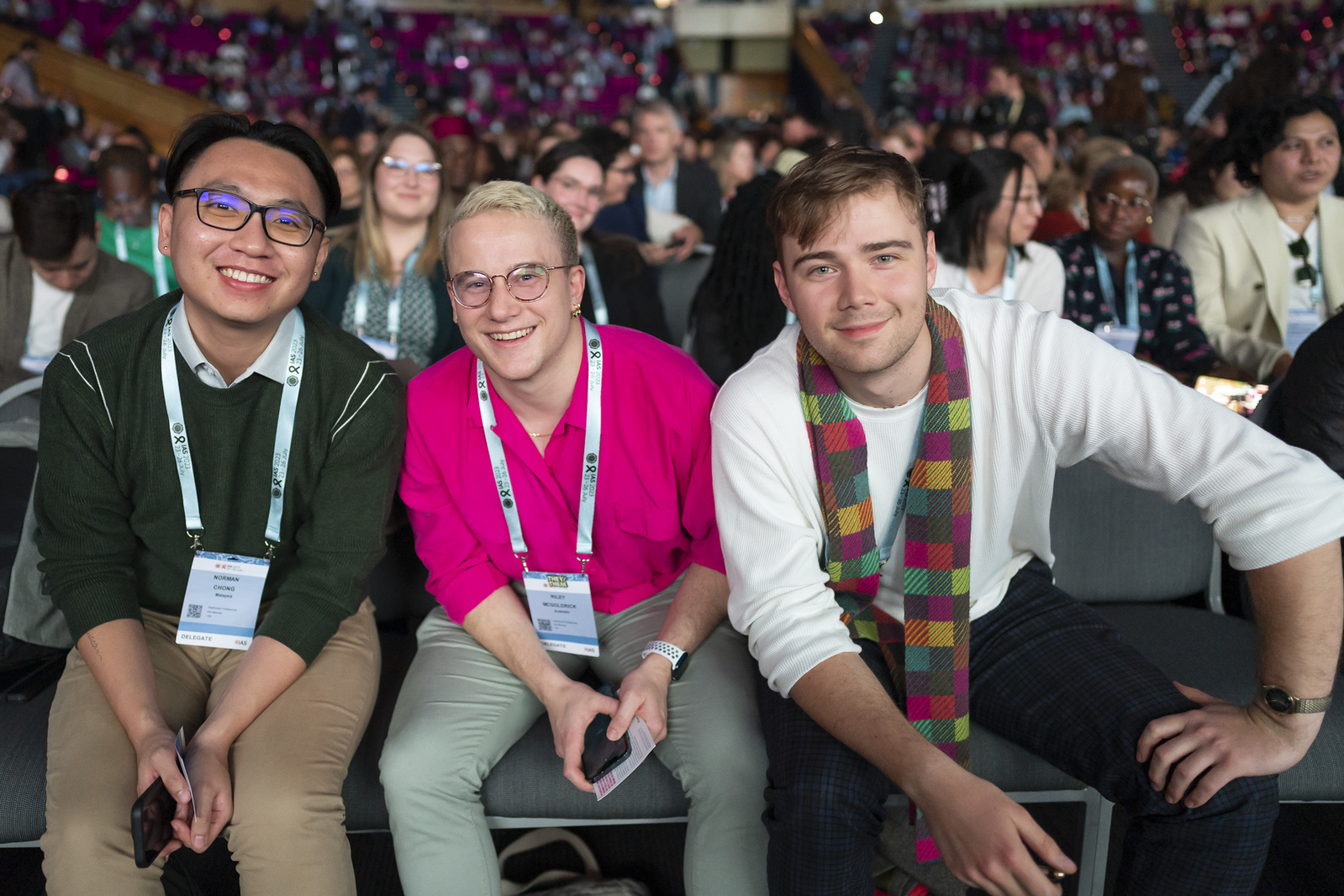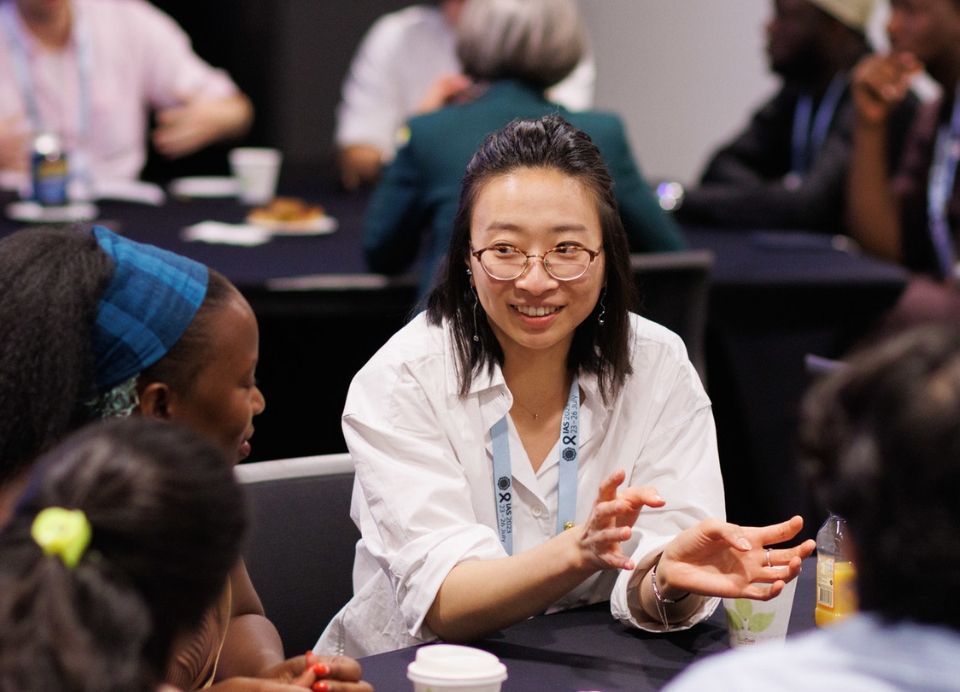24 Aug 2023
Diaries from the 2023 IAS Conference
The 2023 International AIDS Society (IAS) Conference for HIV Science held in Brisbane in July, attracted over 5,000 participants from all over the world. Doherty Institute researchers who were part of this important gathering share a personal account of their experience.
University of Melbourne Rory Shepherd, Postgraduate researcher in the Lewin Lab at the Doherty Institute, writes:
Compared to the dreary winter days of Melbourne, the balmy 22-degree sunny days of Brisbane made an absolute treat for my first attendance at the IAS conference. The 12th biennial HIV science-focused meeting was chaired by Professor Charles Gilks, Dean of the School of Public Health at the University of Queensland, and Professor Sharon Lewin, President of the IAS and Director of the Doherty Institute.
Despite years of research behind the U=U public health message (undetectable = untransmissible; a person with undetectable HIV viral load is unable to transmit HIV to their partner/s), there was a recent finding that most clinicians (66.1 per cent) failed to share share this message with their clients (Sexual Health, 2023). This led to a substantial sized protest at the conference, involving scientists, advocates and clinicians all coming together to warmly share their chant: “Sex is good, sex is fun, sex with zero risk.”
Much of the science remained bright eyed and hopeful about the discoveries yet to come. There was huge attention paid to broadly neutralising antibodies (bNAbs) as both a treatment and prevention. One of the more interesting recommendations was using these bNAbs in babies across at-risk communities, in part because they are more readily taken up and durable in babies than adults, and also because of the smaller dose needed for a newborn.
In sobering contrast to the optimism of basic science, a symposium considering threat of climate change listed many of the growing concerns in implementation and prevention: supply chain breakdown, increased waste production, zoonotic infection risk, megacity overcrowding and increased fungal infection risk (a major deadly risk for the immunosuppressed). This emphasised the need for pandemic preparedness in the years to come, making the formation of the Melbourne-based Cummings Global Centre for Pandemic Therapeutics rather well timed.
As a basic researcher, I’m more than one step removed from the implementation level, which many talks acknowledge are rife with social and funding barriers. Several programs utilise community pharmacies for testing and treatment access, considered more discrete than existing dedicated HIV clinics. One program I found particularly inspiring was a peer-to-peer model established in Chirundu, a town on the border between Zambia and Zimbabwe, with a significant population of female sex workers (FSWs). The researchers engaged with groups of FSWs to communicate the benefits and methods of accessing PrEP (Pre-Exposure Prophylaxis) – an approach which involves taking a specific medication on a regular basis prior to potential virus exposure in order to reduce the risk of infection. The women were then encouraged to spread this important message and share their lived experience with taking and accessing PrEP among their peers. While the routine methods of delivering this message resulted in a 22 per cent uptake of PrEP in this cohort, the peer-to-peer approach was significantly more effective with a 91 per cent PrEP. This clearly demonstrates the power and pragmatism of direct, peer-to-peer communication in a community.
I had the honour of participating in the 2023 IAS Young Leaders Program which connected HIV-focused advocates, researchers and healthcare workers under the age of 26 from around the globe. Basic scientists were certainly the minority in the room. As Australia was the hosting nation, we had the most representatives, tied with Nigeria. It was inspirational to meet so many young peers leading the community to make changes. The main theme was that the best way for us to contribute to the cause beyond our research was to be an effective lay communicator.
It was eye opening talking to advocates who had been living with HIV from the age of 10, spending their adolescence actively fighting back against stigma and institutional inaction. I was similarly taken aback by stories of nurses being attacked by patients in resource-limited settings, and the fear of missing a single day of Post-exposure Prophylaxis (PeP).
The closing ceremony ended with positive tidings on the overwhelming improvement in HIV related diagnosis and healthcare on the African continent as well as Sydney’s near full prevention of HIV transmission. However, the challenges raised at the conference remind us there is still much to understand and barriers to overcome. I truly enjoyed attending the conference, it was a great opportunity to challenge myself and broaden my knowledge. I came home feeling inspired, motivated, determined and feeling excited for future collaborations.

Image: Delegates at the Opening Ceremony of the 12th IAS Conference on HIV Science, July 2023 (L-R: Norman Chong, IAS Young Leader and Research Coordinator at the University of Malaya, Malaysia, Riley McGoldrick, Australia and University of Melbourne Rory Shepherd, Postgraduate Researcher in the Lewin Lab at the Doherty Institute, Australia) - © Conor Ashleigh/IAS
University of Melbourne Kiho Tanaka, Postgraduate researcher in the Lewin Lab at the Doherty Institute, writes:
As I entered the venue, I was quite overwhelmed by the amount of energy that filled the place. There were thousands of people from all over the world, students, researchers, public health professionals, community workers, clinicians, social scientists, all conversing, exchanging thoughts and ideas with such passion and enthusiasm.
The scientific findings presented were cutting-edge and inspirational. The talks included a wide range of topics: basic molecular virology, immunotherapy, novel assays, primate studies, vaccines, the use of broadly neutralising antibodies for therapeutics and prevention, combinatorial approaches for cure, and so on. Furthermore, sessions on long-acting injectable ART, equitable financing strategies for country-led responses, and addressing end-user preferences were some of the topics I found extremely insightful as these are crucial for successful implementation of therapeutics and healthcare support.
What I really cherished the most at the conference was the in-person discussions I had with various people during the poster sessions and in the Young Leaders Program. I had interesting discussions with doctors and researchers working with newborns. We talked about the shock and kill approach to HIV cure and if that is applicable to babies, the current ART regimens for newborns and the burden on mothers. I met people from Ghana, Kenya and Nigeria working with young people living with HIV. They shared some of the issues they are facing, such as treatment adherence, difficulty seeking medical care (the result of stigma and having to travel to a different village for treatment) and access to correct information. It was inspirational to meet so many young peers leading the community to make changes. At the end of the conference, we exchanged contacts and said our goodbyes, feeling excited for future collaborations.
I truly enjoyed attending the conference and came home feeling more inspired, motivated, and determined. It was a great opportunity to challenge myself and broaden my knowledge.

University of Melbourne Kiho Tanaka, Postgraduate researcher in the Lewin Lab at the Doherty Institute and other delegates at the 12th IAS Conference on HIV Science, July 2023 - © Conor Ashleigh/IAS


